It was a particularly cruel and brutal act that caught the attention of much of the civilized world. On Oct. 3, 1985, Leon Klinghoffer, a disabled wheelchair bound Jewish New Yorker, and his wife Marilyn boarded the Achille Lauro to celebrate their 36th wedding anniversary with a Mediterranean cruise. A few days later, four armed Palestinian terrorists aboard the ship took control and held the passengers and crew hostage. Their demands to release 50 Palestinians in Israeli jails were not met. On October 8, one of the Palestinians shot Leon in the head and his body and wheelchair were thrown into the sea.
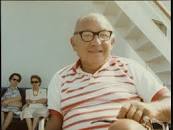
Leon Klinghoffer
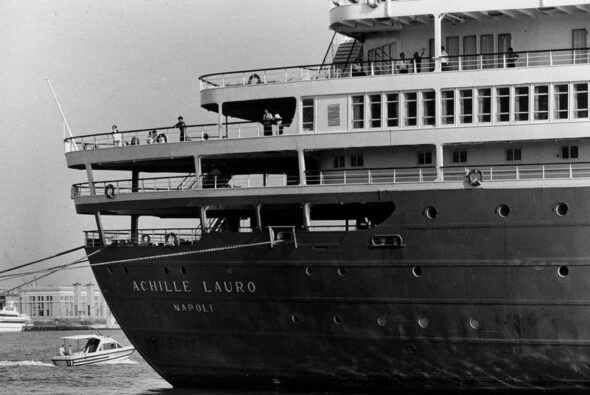
Two days after the killing, passengers stand on the top deck aboard the Italian cruise ship Achille Lauro as the ship is docked at Port Said, Egypt. Photo credit: Michel Lipchitz/AP and New York Daily News.
Author misleads about the killing and the controversial opera
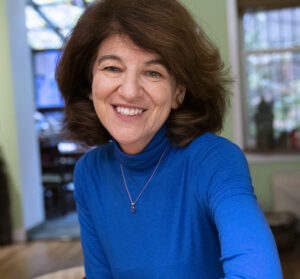
Julie Salamon
And now we are reminded again about the event by Julie Salamon’s book An Innocent Bystander: The Killing of Leon Klinghoffer which was published in June 2019. Salamon is a former New York Times and Wall Street Journal reporter. Her promotional appearances, particularly one aired on C-SPAN on September 7 (more below), and related media coverage are likely to have a far greater impact than the book itself which details at great length the Palestinian takeover of the cruise ship as well as providing several misleading assertions. Mention is made of the book’s dubious assertion that Klinghoffer was killed because he was an American not because he was a Jew (more below).
And much is made of the book’s discussion (a full chapter) of the controversial opera about the killing, The Death of Klinghoffer, which premiered both in Brussels and New York (Brooklyn Academy of Music) in 1991 and was staged amid much notoriety in 2014 by New York’s Metropolitan Opera company. Salamon glosses over the opera’s serious problems. An obvious indication of a dark aim of the opera was the choice of the word “death” in the title instead of the obvious one, “killing,” evidently in order to mitigate the malevolent intent of the Palestinian terrorists (more below).
Salamon’s dubious contentions publicized about the killing
For some media outlets, a key point in the book was the alleged reason Klinghoffer was killed. Here are a few examples. In a June 2019 Forward (of New York) interview, Salamon states, “Molqi [the shooter] gave pages and pages of testimony and deposition before the trial and he gave many contradictory reasons. It leaves you wondering if he didn’t just kill him because he was the most vulnerable person… there was an illusion that Americans had then that somehow our government could meddle in the affairs of other people and not have to pay the consequences of it. But we’ve learned very painfully that that’s not true.”
In a June NPR interview – she said: “I was able to interview one of them [the Palestinian terrorist hijackers], the youngest one. I don’t think they knew he [Klinghoffer]was Jewish.”
In a July Algemeiner interview, Salamon said, “The surprising thing was that there was this idea that Leon Klinghoffer was killed because he was Jewish. He was killed because he was an American.” In response to the question, “Is it possible that the terrorist who killed him asked him if he was a Jew, and he said yes?,” Salamon said, “I would say it would have been almost impossible since Molqi, the guy who killed him, didn’t speak English — and Leon Klinghoffer didn’t speak Arabic, and could barely talk. It’s pretty unlikely.”
Salamon’s contention that Klinghoffer was killed only because he was an American is debatable. It seems to fit her apparent world view highly critical of America’s policies as indicated in the Forward interview above. Likewise, in the NPR interview she said, “And, you know, everybody made political hay out of it. Part of what I try to show in the book is how the Reagan administration, which needed a win against terrorism …” She’s referring to the fact that when President Reagan heard that a U.S. citizen had been killed aboard a cruise ship, he ordered a U.S. fighter jet to force the terrorists’ Egyptian escape plane to land in nearby Italy. But after an extradition quarrel with the United States, Italian Premier Craxi allowed the terrorists to flee. In the same vein, she also criticized the Israelis, “The Israeli government right away, as soon as he was killed, said, oh, look; it was a Jewish victim. And so I think everybody wanted to use Klinghoffer’s death for their own purposes.”
She presents questionable evidence. The language barrier problem is speculative. In view of the fact that Palestinians have long been indoctrinated to hate Jews, it seems likely that the killing was due to the fact that the victim was Jewish and possibly also because he was American.
Salamon’s shallow view of the The Death of Klinghoffer
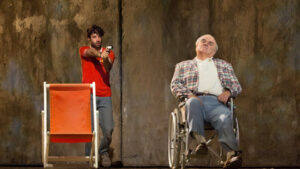
Shooting scene in 2014 Met Opera production, The Death of Klinghoffer
The author responded at length to a question about the opera from the Philadelphia Free Library audience in a book promotion that was broadcast September 7 to C-SPAN’s millions of viewers:
I did talk to John Adams [the opera’s composer] and Peter Sellers [the opera’s first director]. For those who don’t know, there was an opera made out of the killing of Leon Klinghofer in 1991 called “The Death of Klinghoffer” and when it came out, it created a huge firestorm as any opera can do. A lot of people were offended because the opera gave way to the Palestinians and it did contain a scene which was later taken out that today seems kind of benign but it was a little caricature not that nice to the suburban Jewish friends of the Klinghoffers.fter the showing at Brooklyn Academy of Music they did take that scene out.
I hadn’t seen the opera in 1991 but I did see it 2014 when the opera was revived in New York at the Metropolitan Museum [sic] and I became offended because there were many people protesting the opera who hadn’t seen it. I hate it when people protest things they haven’t seen. If they see it and protest, it’s fair game but to protest before you have seen it – no good. At that time I was interested and I went to see it.
I’m not an opera expert by any stretch but I found parts of it incredibly affecting. A part that had been in the earlier version was no longer there. I thought some of the music was quite beautiful. Ultimately the story seemed very melodramatic but the two best arias went to Marilyn [Ms. Klinghoffer]. No question about it; no way you could walk out of that opera and feel sympathetic to the people who killed Leon Klinghoffer. But you might feel sympathy for the Palestinian plight which is a different story. So at that point I thought of doing something on this story as the complexity seemed interesting. There’s a chapter in the book that deals with the opera.
The thing about the opera that is so interesting, [daughter] Lisa Klinghoffer – when she heard they were making an opera in 1991, she was so excited that Peter Sellars, this opera impresario, was going to be involved in it, she tried to get in touch with him to talk to him about it. She got his [phone] number in San Francisco and they spoke and he was pretty dismissive of her, not really mean, just kind of – I don’t need to talk to you because this is a work of art.
I think he made a mistake. He should have respected the sisters. He did say he felt bad.I liked him a lot. He’s a real character. He has a different way of looking at things. He has his own different world view. But the opera itself has a lot of interesting music. Did you [addressing the questioner] see it? Did you like it? I think some of it – you can’t walk out of it and not feel moved by it. So thank you. One more question. No more questions? Good.
In this lengthy monologue about the opera, Salamon admitted, “I’m not an opera expert by any stretch.” This is evident in her observation that the opera was revived in 2014 at New York’s “Metropolitan Museum [of Art]” (listen here). But Salamon, couldn’t have seen it at the Museum since it was staged at New York’s famous Metropolitan Opera House at Lincoln Center in 2014 (it was not dealt with in any form at the Museum).
While Salamon is solicitous of the Klinghoffer family and rightly criticized Sellars for his reprehensible reaction to Lisa Klinghoffer’s attempt to discuss with him the operatic work, the author’s comment here about sympathy for the Palestinians rings hollow. Likewise are her arguably shallow remarks about the opera. Consider the judgment of Richard Taruskin, the eminent American musicologist, critic, and the author of one the most ambitious projects in musicological history, the six-volume, 3,000-page Oxford History of Western Music. He wrote in a New York Times article, Music’s Dangers And The Case For Control (Dec. 9, 2001):
The libretto commits many notorious breaches of evenhandedness, but the greatest one is to be found in Mr. Adams’s music. In his interview, the composer repeats the oft drawn comparison between the operatic Leon Klinghoffer and the ‘sacrificial victim’ who is ‘at the heart of the Bach Passions.’ But his music, precisely insofar as it relies on Bach’s example, undermines the facile analogy…
Timeless tones accompany virtually all the utterances of the choral Palestinians or the terrorists, beginning with the opening chorus. They underscore the words spoken by the fictitious terrorist Molqui: ‘We are not criminals and we are not vandals, but men of ideals.’ Together with an exotically ‘Oriental’ obbligato bassoon, they accompany the fictitious terrorist Mamoud’s endearing reverie about his favorite love songs. They add resonance to the fictitious terrorist Omar’s impassioned yearnings for a martyr’s afterlife; and they also appear when the ship’s captain tries to mediate between the terrorists and the victims.
They do not accompany the victims, except in the allegorical ‘Aria of the Falling Body,’ sung by the slain Klinghoffer’s remains as they are tossed overboard by the terrorists. Only after death does the familiar American middle-class Jew join the glamorously exotic Palestinians in mythic timelessness. Only as his body falls lifeless is his music exalted to a comparably romanticized spiritual dimension.
The opera’s troubled librettist overlooked by Salamon
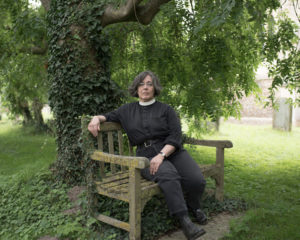
Alice Goodman
In an indication of a troubled psyche, Goodman renounced her American Jewish heritage by joining the Anglican Church (The Church of England), the leadership of which is known for its hostility toward the Jewish state. Moreover, this act took place during the period in which she was writing the words to be sung in the anti-Jewish, anti-Israel opera about the killing of a Jew.
The New York Times said in 2017: “Alice Goodman, who wrote its [the opera’s] enigmatic, poetic libretto, seemed to vanish from the scene after her subsequent collaboration with Mr. Adams and Mr. Sellars, in the still-controversial Death of Klinghoffer. Raised Jewish, she converted to Christianity in 1989 and in 2001 was ordained an Anglican priest in England. Now 59, she serves around 6,000 people in a group of parishes in Cambridgeshire, driving a battered car festooned with flinty, expletive-strewn bumper stickers with mottos like “Doing my part to piss off the religious right.”
The Guardian (of London) said in a 2012 article, Alice Goodman: The furore that finished me: “Three decades ago, Alice Goodman wrote the libretto to The Death of Klinghoffer, an opera about a Jewish American murdered by Palestinian terrorists. It ended her career, midwestern Jew turned Cambridgeshire clergywoman, apostate librettist …”
Goodman shocked opera fans by use of the F-word in her “Nixon in China” (first performed in October 1987) opera collaboration with Adams. Both Adams/Goodman operas exhibit an obsession with what they imagine to be Jewish guilt. In the Nixon opera, the only villain is the Jewish former Secretary of State, Henry Kissinger, portrayed as cruel and cunning. In the Adams/Sellars (without Goodman) “Doctor Atomic” opera (premiered in October 2005), real-life Jewish physicist J. Robert Oppenheimer (known as the “father of the atomic bomb”), the opera’s central character, is portrayed as tortured by feelings of guilt about the atom bomb.
Does the author believe that words matter?
The Death of Klinghoffer opera story line can be characterized fairly as “Understandably aggrieved Palestinian Arabs wreak vengeance on Jew standing in for all his perfidious co-religionists.” This is the opera’s obscene inversion of the reality that was a cruise ship hijacking and subsequent murder of an American Jew by Arab terrorists.
Salamon overlooks the actual words sung in the opera (Goodman’s libretto) (audio). The tone is set at the outset. The opera opens with the Chorus of Exiled Palestinians followed immediately by the Chorus of Exiled Jews. The first Chorus promises righteous violence and vilifies Israelis with a false, grotesque characterization in which the threat, “Let the supplanter …” mocks the passages in the Bible’s Genesis book regarding Jacob (the Hebrew form of the name means “usurper” or “supplanter”) who tricked his brother Esau out of his birthright and who came to be known as Israel. The idea here of the “supplanter” fits the Palestinian propaganda falsification that the Jews stole their land. The “passed over our street” phrase seems intended to equate the Israelis to the “Destroyer” of Exodus 12:23 (Jewish Publication Society version). From the Chorus of Exiled Palestinians:
My father’s house was razed
In nineteen forty-eight
When the Israelis passed
Over our street […] Israel Laid all to waste […] Let the supplanter look
Upon his work. Our faith
Will take the stones he broke
And break his teeth.
On the other hand, the Chorus of Exiled Jews derogates Israeli Jews, ascribing to them a sense of self-guilt and a dark pathology merging sexual lust with lust for the land:
When I paid off the taxi, I had no money left,
And, of course, no luggage. My empty hands shall
Signify this passion, which itself remembers.
O Daughter of Zion, when you lay upon my breast
I was like a soldier who lies beneath the earth
Of his homeland, resolved.
You said, I am an old woman. I thought you were dead.
I have forgotten how often we betrayed one another.[…] Let us, when our lust is exhausted for the day […] Your neighbour, the one who let me in, She was brought up on stories of our love.
Act 2, scene 1 contains this baleful characterization of Jews:
Wherever poor men
Are gathered they can
Find Jews getting fat.
Concluding
Salamon praises an opera that is clearly prejudiced against Jews and romanticizes Palestinian terrorists and the false narrative that Palestinians are driven to resistance because Jews stole their land. Likewise, she aims to humanize Palestinian terrorists in the book and in her public appearances.
This does no favor for non-violent, non-hating Palestinians or for unwary supporters of Palestinian violence – or for peace. Salamon overlooks Palestinian cradle to grave indoctrination (continuously documented since 1996 by Palestinian Media Watch) to hate and wreak violence upon Jews. Salamon’s apparent thesis, like that of some including most of the mainstream media, that the Israeli-Palestinian conflict is simply about two peoples at odds with each other – each with rights and wrongs – contradicts history and the truth.
